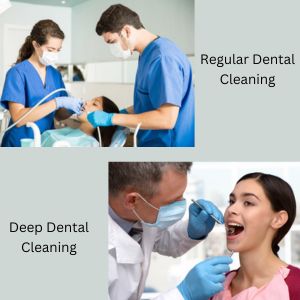What Is Regular Dental Cleaning?
Regular dental cleaning, also known as prophylaxis, is a routine procedure aimed at maintaining oral health. During this process, a dental hygienist removes plaque, tartar, and surface stains from your teeth.
At Inspire Dental Clinic, regular dental cleanings are performed to prevent common oral health issues like cavities and gum disease. The process typically includes:
- Plaque and tartar removal using specialized tools.
- Polishing teeth to remove surface stains.
- Fluoride treatment to strengthen enamel and protect teeth.
Purpose of Regular Cleaning:
- Prevents cavities by eliminating plaque buildup.
- Reduces the risk of gum disease.
- Keep your teeth looking bright and polished.
- Keeps gums healthy and free from inflammation.
- Polishes teeth to remove surface stains from food and drinks.
- Promotes fresh breath and reduces bad odor.
When to Get Regular Dental Cleaning:
- Recommended every six months for individuals with good oral health.
- Ideal for those without gum disease or significant dental issues.
If you’re maintaining good oral health, visiting Inspire Dental Clinic for regular dental cleaning in Gurgaon every six months can help you keep your smile at its best.
What Is Deep Dental Cleaning?
Deep dental cleaning, also called scaling and root planing, is a more intensive procedure designed for patients with gum disease. This treatment goes beyond the gum line to remove bacteria and tartar from the roots of your teeth.
The process involves two main steps:
- Scaling: Removal of plaque and tartar from the tooth surfaces and beneath the gum line.
- Root Planing: Smoothing the tooth roots to help gums reattach and prevent bacteria buildup.
Purpose of Deep Cleaning:
- Treats gum disease and stops its progression.
- Promotes reattachment of gums to teeth.
- Prevents tooth loss caused by advanced gum disease.
- Helps to reduce gum inflammation and infection.
- Helps control the spread of bacteria beneath the gums.
- Prevents further damage to bone and soft tissue.
When to Get Deep Dental Cleaning:
- Necessary for individuals diagnosed with periodontitis (advanced gum disease).
- Recommended when gum pockets exceed 3mm, indicating bacterial accumulation beneath the gums.
You can receive expert care for deep dental cleaning in Gurgaon, tailored to your specific needs.

Key Differences Between Regular and Deep Dental Cleaning
- Purpose
Regular Dental Cleaning: Preventive care
Deep Dental Cleaning: Treatment for gum disease
2. Focus
Regular Dental Cleaning: Above the gum line
Deep Dental Cleaning: Below the gum line
3. Frequency
Regular Dental Cleaning: Every six months
Deep Dental Cleaning: As prescribed, typically once or twice
4. Duration
Regular Dental Cleaning: Short, around 30-60 minutes
Deep Dental Cleaning: Longer, may require multiple visits
5. Tools Used
Regular Dental Cleaning: Standard cleaning tools like scalers and polishers
Deep Dental Cleaning: Advanced instruments like ultrasonic scalers
6. Signs You Need It
Regular Dental Cleaning: Recommended for healthy gums and no signs of gum disease
Deep Dental Cleaning: Needed if gums are swollen, bleeding, or receding
7. Post-Care
Regular Dental Cleaning: Simple at-home care like brushing and flossing
Deep Dental Cleaning: May require follow-ups, antibiotics, or medicated rinses
8. Health Benefits
Regular Dental Cleaning: Maintains healthy teeth and gums, preventing decay and gingivitis.
Deep Dental Cleaning: Reduces inflammation, promotes gum healing, and prevents tooth loss.
9. Impact on Overall Health
Regular Dental Cleaning: Prevents bacteria from spreading into the bloodstream, maintaining general health.
Deep Dental Cleaning: Stops gum disease from progressing, which could otherwise affect systemic health (e.g., heart disease, diabetes).
10. Impact on Bacteria
Regular Dental Cleaning: Removes surface-level bacteria and plaque.
Deep Dental Cleaning: Targets bacteria deep within the gums to prevent infection progression.
Why Choose Inspire Dental Clinic in Gurgaon?
We prioritize personalized care to meet your dental health needs. Whether you require regular dental cleaning or deep dental cleaning in Gurgaon, our expert team ensures a comfortable and effective experience.
Conclusion
Both regular and deep dental cleanings are essential for different stages of oral health. Regular cleanings help maintain healthy teeth and gums, while deep cleanings address advanced gum issues. Visiting a trusted clinic like Inspire Dental Clinic ensures you receive the right treatment tailored to your needs.
